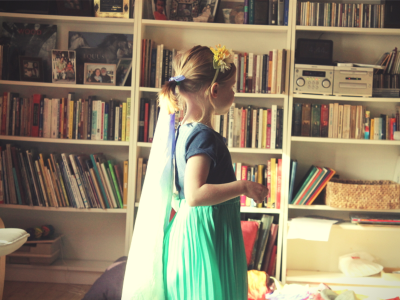Mindfulness and simplicity go hand in hand. When we start to practice simplicity, we naturally become more mindful. As we become more mindful, we naturally make our lives simpler.
However as an artist with creative “clutter,” for a long time I wasn’t on board with the simplicity that my husband wanted. He liked the aesthetic of minimalism. I loved piles of books.
But around the time my first daughter was starting to toddle, I began to change my mind.
With a year of experience as a mother, I could see a lot of things about our consumer, media-driven culture that I didn’t want us to buy into as a family. I cringed at babies being propped up to watch Baby Einstein. I met screen-attached kids and knew that wasn’t for us. The piles of cheap plastic toys held no appeal either.
I was getting quite clear on what I didn’t want. But what did I want?
I wanted our lives to be more connected to nature. I wanted to teach through our choices that happiness comes through connection with each other. It’s not something you can buy at the mall.
So when the book, “Simplicity Parenting” by Kim Jon Payne fell into my lap, I immediately resonated with it.
I didn’t realize what a big change this book would lead us to.
Simplicity Parenting clearly lays out the problems and pressures that our hurried, materialistic, competitive, media-driven culture puts on children. The onslaught of too much stuff and fast-paced schedules wreak havoc – especially for “spirited” children like my oldest. Payne lays this out powerfully with studies and stories.
He also gives practical tools for simplifying your environment and schedules, in order to introduce more rhythm and peace in your home.
For children, simplicity leads to calm security, sanity, and connection. {Tweet it!}
In reading this book, I realized that there were good reasons for my instinctive wariness of all the “stuff” marketed towards kids. The profusion of distracting toys is not just a symptom of excess, but it can also cause fragmentation and overload for children.
Simplifying stuff
As we started to cut down, we saw that a smaller quantity of simpler toys actually does invite more imaginative play. This deep, undistracted play is the childhood corollary of mindfulness – attention.
Cutting out the clutter, we could see that it was easier to take care of things. We spent less time cleaning up and managing our stuff. Also, the girls valued what they had more.
The simplification began to filter into other areas of our home. We sent a steady stream of stuff to Goodwill, moving through different areas over time.
With each de-cluttering, I felt relieved of a burden. I hadn’t realized how much time and energy was spent on managing my stuff. This started a mindset-shift: Instead of seeing only “cool new stuff,” we began to see the time and energy spent for care and maintenance. We became mindful of the full picture, not just the advertised promise of “new.”
Simplifying schedules
Simplicity Parenting also makes a strong case against the hurried, over-scheduled childhood. If a child has a schedule full of activities, they will begin to rely on external stimulation and keep searching for the next, bigger distraction. They may become unable to handle ordinary situations.
Children need downtime to go into their imaginations and appreciate the ordinary treasures of life. Boredom is a gift! {Click to tweet!}
I wanted my children to have unscheduled time each day to daydream and play. I wanted to protect the magic of their childhood.
How did we implement this? We chose to limit them to one organized activity (swimming, music, etc.) at a time. We started to keep a steadier rhythm to the week. We also started to consciously balance a busier day with calmer ones.
The results were pretty clear. My “spirited” child responded with less tantrums and more calm.
Mindfulness is the doorway to simplicity
Before we embrace simplicity, there is an inner transformation that takes place. You start by realizing that more stuff and more distraction does not bring happiness. In fact, it feeds the craving mind that leads to suffering.
You start to realize that appreciating what is here and now is the key to happiness. You know that all the finest things are moot without true presence and gratitude.
You may then start to realize that quality wins out over quantity – not only with possessions, but with your commitments. Rushing from one thing to another leaves no time to appreciate and reflect upon your days.
Daily practice to cultivate mindfulness help us become more grounded and present. It can be yoga or meditation, or perhaps just taking a walk without headphones.
When we start to really appreciate the magnificent beauty of an ordinary day, then the door has been opened to lasting joy.
What about you?
Have you embraced simplicity? How do you deal with the siren-call of distraction? Begin the conversation in the comments below!
Thank you so much for reading. Making a connection with my readers fills me with so much gratitude, so keep your wonderful messages coming!
Be well,
P. S. There are certain things I only share on email! Make sure you sign up for my newsletter to get exclusive personal insights on mindful living.



